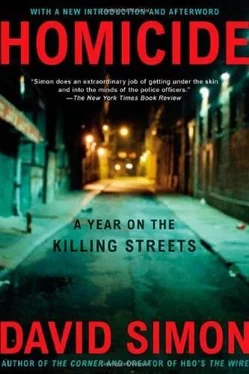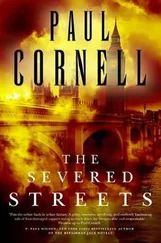Two months ago, Mark Tomlin caught the year’s first and only autoerotic death. It was an engineer in his late thirties, trussed up on his bed in leather underwear, suffocated by a plastic bag that the victim had placed on his own head. There were pulleys and levers that controlled the cords by which the victim was bound, and by moving an arm in a certain direction, the man could have freed himself. But long before he could do that, he passed out from lack of oxygen-a consequence of the plastic bag, which he had used to induce hypoxia, an ethereal, oxygen-deprived state in which masturbation supposedly becomes more erotic. That bedroom was a strange sight, and Tomlin, of course, couldn’t help but show Polaroids to a few thousand other cops. After all, the poor guy looked damned silly decomposing in his leather shorts, arms trussed up over his head, toes clamped together by thumbcuffs, bondage magazines scattered across the dresser. Bizarre stuff, and no one would have believed it without the photographs. Neither privacy nor dignity had much of a chance on that one.
Almost every detective has encountered two or three scenes where some relative tried, for reasons of propriety more than deception, to dress a dead body. Likewise, almost every detective has handled a dozen overdoses in which mothers and fathers had felt compelled to hide the needle and cooker before the ambulance arrived. One suicide prompted a parent to painstakingly rewrite the victim’s note in the desire to exclude one especially embarrassing admission. The world never stops insisting on values and standards, although such things no longer matter to the dead. The world never stops calling for a little dignity, a little propriety, but the cops never stop calling for the morgue wagon; between the two lies an abyss that can never be bridged.
In the Baltimore homicide office, privacy is a stillborn idea. The unit, after all, is a locker room of sorts, a male-dominated purgatory in which thirty-six detectives and detective sergeants wander in and out of each other’s lives, cracking jokes as this detective’s marriage implodes and that detective shows the unmistakable signs of alcohol addiction.
A homicide detective isn’t any more or less degenerate than any other middle-aged American male, but since he spends his life prying up other men’s secrets, he has little regard for his own. And in a world where the act of premeditated murder becomes routine, any more subtle sin has trouble competing. Any man can drink too much and wreck his station wagon on an upcounty road, but a homicide detective can tell the rest of his squad the story in a voice that betrays equal shares of bravado and embarrassment. Any man can pick up a woman in a downtown bar, but a homicide detective will later entertain his partner with a comedic soliloquy that describes in detail all the later action at the motel. Any man can lie to his wife, but a homicide detective will sit in the middle of the coffee room yelling into a phone extension that he has to work late on a case and if she doesn’t believe that, she can go to hell. And then, after convincing her, he will slam down the receiver and stalk over to the coat rack.
“I’m down at the Market Bar,” he will tell five other detectives, all of whom are fighting back laughter. “But if she calls back, I’m on the street.”
A detective understands that another world is out there, another universe in which discretion and privacy still have meaning. Somewhere far from Baltimore, he knows, there are taxpayers who hold dear the idea of a good and secret death-a well-lived life, becalmed at its end, extinguished in some private, comfortable place with equal measures of grace and solitude. They’ve heard a lot about that kind of death, but they rarely see it. To them, death is violence and miscalculation, mindlessness and cruelty. And what, a detective can ask, does privacy matter amid that kind of carnage?
Several months ago, Danny Shea from Stanton’s shift drove to a high-rise apartment house near the Hopkins campus for an unattended death. She was an elderly music teacher, fully rigored on her daybed, with the score of a Mozart concerto still open on the piano. The FM radio was playing quietly in the living room, tuned to a classical station at the end of the dial. Shea recognized the piece.
“You know what that is?” he asked a uniform, a young man writing his report at the kitchen table.
“What’s what?”
“The piece on the radio.”
“Uh-uh.”
“Ravel,” said Shea. “‘Pavane to a Dead Princess.’”
It was a beautiful, natural death, quite startling in its perfection. Shea suddenly felt himself an intruder in the old woman’s apartment, a violator of a genuinely private act.
A similar feeling now comes over Donald Waltemeyer when he looks at a dead addict and listens to her husband walking up the stairs. There is nothing beautiful or poignant in the death of Lisa Turner: Waltemeyer knows that she was twenty-eight years old, that she was from North Carolina and that she was married. And for reasons beyond his comprehension, she came up to this second-floor shithole to fire heroin until it killed her. End of story.
And still, something clicks for just a moment, some long-lost switch in Waltemeyer’s brain is suddenly thrown to overload. Perhaps it’s because she was young, perhaps because she looks pretty in the light blue sweater. Perhaps it’s because a price must be paid for all this privacy, because you can only be a bystander for so long without paying some of the cost yourself.
Waltemeyer looks down at the girl, listens to the husband struggle up the stairs, and suddenly, almost without thinking, reaches for the falling shoulder of a dead woman’s sweater.
When the husband appears at the door, Waltemeyer asks the question immediately: “Is that her?”
“Oh God,” the man says. “Oh my God.”
“Okay, that’s it,” says Waltemeyer, motioning to the uniform. “Thank you, sir.”
“Who the hell is he?” says the husband, glaring at Milton. “What the hell is he doing here?”
“Get him out of here,” says Waltemeyer, blocking the husband’s view. “Take him downstairs now.”
“Just tell me who he is, goddammit.”
Both uniforms grab the husband and begin pushing him out of the apartment. Easy, they tell him. Take it easy.
“I’m okay. I’m all right,” he tells them in the hallway. “I’m okay.”
They guide him to the other end of the hall, standing with him as he leans into the plasterboard and catches his breath.
“I just want to know what that guy was doing in there with her.”
“It’s his apartment,” says one of the uniforms.
The husband shows his pain, and the uniform volunteers the obvious information: “She just went in there to fire up. She wasn’t fucking the guy or anything like that.”
Another small act of charity, but the husband shakes it off.
“I know that,” says the husband quickly. “I just wanted to know if he was the guy that got her the drugs, that’s all.”
“No. She brought hers with her.”
The husband nods. “I couldn’t get her to stop,” he tells the cop. “I loved her, but I couldn’t get her to stop it. She wouldn’t listen. She told me where she was going tonight because she knew I couldn’t stop her…”
“Yeah,” says the cop, uncomfortable.
“She was such a beautiful girl.”
The cop says nothing.
“I loved her.”
“Uh-huh,” says the cop.
Waltemeyer finishes the scene and drives back to the office in silence, the entire event now confined to a page and a half of his notebook. He catches every light on St. Paul Street.
“What did you get?” asks McLarney.
“Nothing much. An OD.”
“Junkie?”
“It was a young girl.”
Читать дальше












